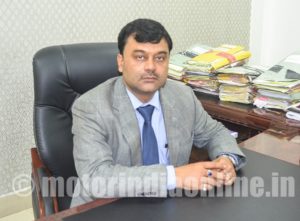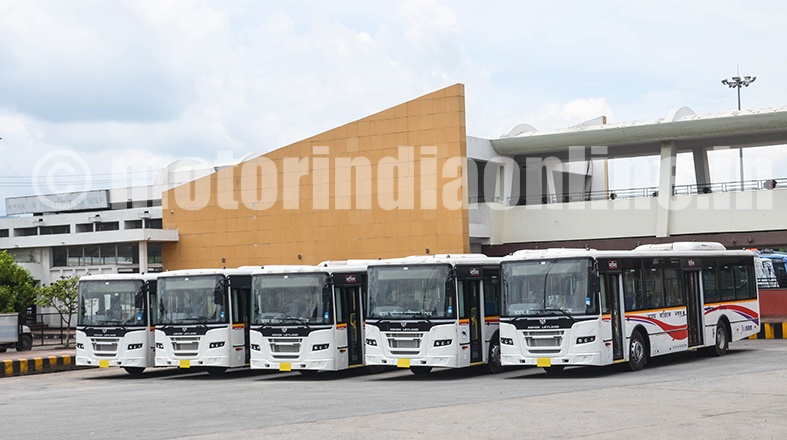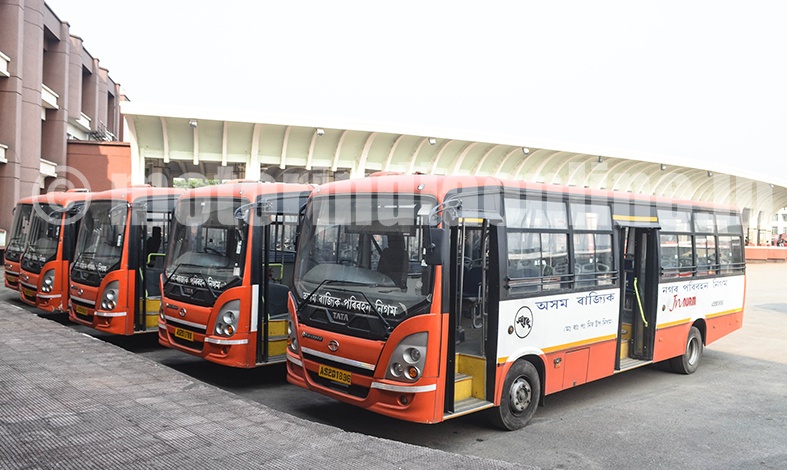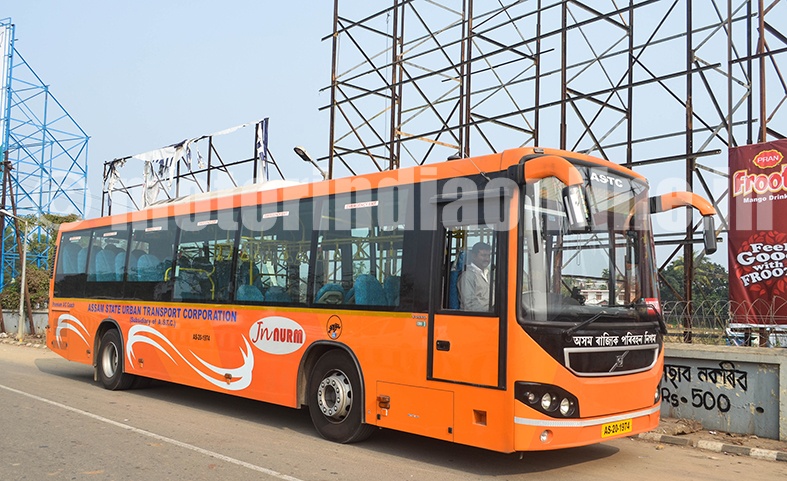The Assam State Transport Corporation (ASTC) is the largest State-owned state transport corporation engaged in transport of passengers and freight in North-East India. ASTC started its services in 1948 and the present day corporation was established on March 31, 1970, under the Road Transport Corporation Act, 1950. Over the years, the corporation has been in service for the people of region ensuring safe, time-bound journey at affordable cost. We met Mr. Anand Prakash Tiwari, Managing Director, ASTC, at its Paribahan Bhavan Office in Guwahati to know more about its role in connecting people and places across Assam and North-East India.

Mr. Tiwari said: “Over the years, since its inception as a corporation in 1970, ASTC has grown in terms of fleet expansion, increment of routes and an increase in number of depots and stations across Assam. Our bus fleet has increased from an initial 150 buses to 1300 buses at present for day and night services. We adopted privatization policy under which 3000 buses were included under the ASTC-umbrella.”
ASTC also initiated inter-State routes connecting Nagaland, Manipur, Arunachal Pradesh and West Bengal, which helped the people to travel to the neighbouring States at ease and comfort. The Corporation also started pilgrimage trips with ticket concessions for the devotees under the “pilgrimage policy”. Such concessional trips were organized to holy pilgrimage sites likes Bodh Gaya in Bihar and Puri Jagannath Yatra in Odisha. ASTC has developed over the years good infrastructural facilities and good workforce supporting it. The administration work is supported by its experienced team of engineers, chartered accountants and law professionals.
Speaking on ASTC’s bus services within Guwahati, he elaborated: “ASTC has around 300 buses dedicated to operations in Guwahati City including both smart AC buses like Volvo and Ashok Leyland Jan Bus and non-AC city bus segment comprising of Tata Marcopolo buses. Our goal is to provide comfortable and efficient transportation for Guwahati City, thereby reducing private vehicle congestion and promoting use of public transport”.
The MD added: “The ASTC city buses operate from 6 am till 12 midnight covering 32 major routes within the city limits. We have added AC Volvo semi low-floor buses and Ashok Leyland low-floor AC Jan Bus under the JnNURM-II Scheme. It is worth mentioning here that 200 buses were sanctioned to Guwahati City under the JnNURM-I Scheme earlier in the year 2008-09”.
Focussing on inter-city routes, he told that the Corporation was incorporating new Volvo buses for inter-city routes in March next under ASTC’s PPP (Public Private Partnership) model. The proposed initial routes under first phase are Guwahati to West Bengal, Nagaland, Manipur, Arunachal Pradesh. ASTC also plans to run premium Volvo Services to North Bihar and Sikkim in the second phase of route expansion.
ASTC forms an integral part of Assam and represents the people of the State. The Corporation runs special services like Kamakhya Temple Bus Service, Majuli Satra Parikrama, and Pobitora National Park Service. ASTC provides Volvo AC semi low-floor services from its Ulubari Volvo Point to Guwahati LGB Airport. The service starts at 6:15 am in the morning with buses available at every half an hour and one hour interval till 3:30 pm in the afternoon, with free travel privilege for children below 6 years. ASTC have also started long distance intercity routes under its “City Connectivity Service” with Volvo 8400 semi low-floor buses connecting Guwahati – Tezpur, Jorhat, Sibsagar and Hojai.
Speaking on the Corporation’s privatization policy, he added: “The PPP (Public Private Partnership) model is based on the adoption of new thoughts and concepts in order to improve the services of the ASTC. PPP model promotes development and planning with private partners. We do understand that social responsibility is our duty as a state transport undertaking, keeping in mind economic viability, but economic viability cannot be our prime priority in the long run. We always remain committed to our social commitment in providing better services for the public. Private partners have been beneficial in business development and they have brought good returns to the corporation, enhancing quality of service, and providing smart infrastructure to work towards development.”
The Corporation Head further observed that few services, including maintenance of cleanliness at bus terminals and in buses have also been outsourced. With ASTC increasing its fleet with its own buses and on PPP model – “Under ASTC Operation”, the STU unit have been improving its maintenance infrastructure, all over Assam.
ASTC currently has 10 workshops, 9 operational divisions, 150 officers for operational works, supported by good number of engineers, chartered accountants and law professionals. The Corporation has its central depot at Rupnagar in Guwahati for maintenance of its buses. It has been adhering to the recent bus codes, giving top priority to passenger safety.
The STU has a driver training program which has been started in all its divisions. The corporation takes help from voluntary organizations in conducting the training program. In this regard, he added: “Consultancy services have been sought from knowledge partners to enhance the skills of the corporation staff. The ASTC driver training program has helped the corporation to maintain fuel-efficiency and road-safety of its vehicles thus ensuring passenger safety on board on our buses”.
ASTC has a good customer-service support and a public complaint and query addressing cell. It has a control room with toll-free contact number for public grievance. It also has email facilities, dedicated mobile number services and help through Whatsapp.
The ASTC customer service have been widely appreciated by passengers and the public for its 24×7 effective services on the operation front. ASTC also plans for a public grievance e-platform which is due to be started from April 2017. The corporation also stresses on “Smart Mobility” and RTPI (Real Time Passenger Information) platform as its prime priority for its sustainable future services. The corporation has a GPS monitored fleet and it plans to introduce electronic-ticketing and electronic-tickets in days to come. It plans to provide mobile-ticket machines to its crews. ASTC will also introduce exclusive multi-feature app for mobile phones on android and iOS platforms.
With a large fleet of buses, ASTC is looking forward to the “Mukhya Mantri Lok Parivahan Yojna” to be implemented by the Government of Assam by August next, wherein it plans to connect far-flung areas in Assam, thus improving inter-connectivity and transportation.
Sharing his views on the JnNURM scheme, Mr. Tiwari said: “Under JnNURM-I scheme 200 buses were sanctioned to Guwahati City. The scheme was piloted by Guwahati Metropolitan Development Authority, which procured the buses and finally handed over to ASTC for operationalization of the buses. The scheme was again extended for the year 2013-14, and under JnNURM-II bus funding scheme, ministry of urban development sanctioned 400 buses for Guwahati City”.
ASTC have been a symbol of faith, belief and safety for the people of Assam. It terms its trained drivers, road safety concern and clean buses as its USPs over the private operators in the region. On the same lines, its city bus fleet undergo proper workshop check-up, routine bus checks under scheduled maintenance.
ASTC city buses have unique fleet-management system which accounts for an upper hand over private buses. Giving his opinion on bus operation in rough terrains and challenging road conditions in the region and natural calamities like floods, he said: “The hilly areas of North Cachar Hills and Karbi Along and the challenging and rough terrains of Dhemaji and North Lakhimpur prone to seasonal floods, are economically not viable but as its dedication towards providing services to people, ASTC is providing the bus services under extreme conditions. ASTC buses have to undergo frequent checking and pro-active maintenance to operate on these routes as the road conditions prove sensitive to mechanical maintenance of our buses”.
Asked about sustainable road connectivity in Assam and the North-East, Mr. Tiwari expressed: “In coming days we will be able to witness integrated terminus wherein bus terminals, airport and railway services will be integrated on a common platform to provide integrated-mobility services”. Expressing his views on Smart Transportation for Smart City Guwahati, he termed ITMS (Intelligent Traffic Management System) solution to be implemented in Guwahati in 2017. The corporation have already set the blueprint of the project and is currently studying the project under the guidance of experts.
The Corporation has played a positive role in connecting places and people of Assam right from North-Bank to South-Bank of Brahmaputra, and from Barak-Valley to Brahmaputra-Valley, through its dedicated and devoted services.
Mr. Tiwari said that there are challenges to be examined and addressed and the shortcomings overcome by undertaking planned strategies and implementation. “I believe we have to undertake measures to enhance capability of human resources, and use effective technology to go ahead with long term goals to connect places and people by our services”, concluded the MD on an optimistic note, forecasting a vibrant future for ASTC in its dedicated service towards Assam and North-East India.
ASTC is a member of the Association of State Road Transport Undertakings (ASRTU) which plays a leading role in the All-India Smart-Move High Level Group along with the Bus Operators Confederation of India (BOCI). The group, led by IRU, the global road transport organisation, is currently working on finding solutions to the mobility challenges in India and aims at seeing success stories similar to ASTC’s in the whole country.
ASTC Stats
- Founded in 1948 as Department and Constituted in 1970 as Corporation
- Number of buses in fleet: Night and Day Service –1288 / City Buses – 271. Total Buses – 1559
- Longest route operated at present : Guwahati – Lekhapani (Via Dibrugarh / Tinsukia) (670 km)
- Distance covered everyday : 67,700 km
- Passengers carried daily : 14,200
- Schedules per day : 500
- Workforce : 5,000


